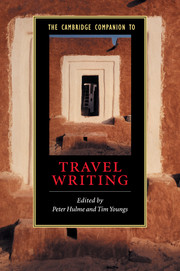Book contents
- Frontmatter
- Introduction
- Part 1 Surveys
- 1 Stirrings and searchings (1500-1720)
- 2 The Grand Tour and after (1660-1840)
- 3 Exploration and travel outside Europe (1720-1914)
- 4 Modernism and travel (1880-1940)
- 5 Travelling to write (1940-2000)
- Part 2 Sites
- Part 3 Topics
- Chronology
- Further reading
- Index
- Series List
4 - Modernism and travel (1880-1940)
from Part 1 - Surveys
Published online by Cambridge University Press: 28 May 2006
- Frontmatter
- Introduction
- Part 1 Surveys
- 1 Stirrings and searchings (1500-1720)
- 2 The Grand Tour and after (1660-1840)
- 3 Exploration and travel outside Europe (1720-1914)
- 4 Modernism and travel (1880-1940)
- 5 Travelling to write (1940-2000)
- Part 2 Sites
- Part 3 Topics
- Chronology
- Further reading
- Index
- Series List
Summary
In his book, The English Novel, Ford Madox Ford comments that over the preceding hundred years a growing 'ease of locomotion' had profoundly changed the English-speaking world. 'The habit of flux', he says, had been born; people moved around in an unprecedented way. Ford, a romantic Tory, was in theory ambivalent about this change, but in practice he embodied it. A prefatory note to the book underlines his point. It was written, he tells us, 'in New York, on the S. S. Patria, and in the port and neighbourhood of Marseilles during July and August, 1927', though he 'made certain alterations' in Paris over the new year of 1930; appropriate creative circumstances for the editor of an avant-garde magazine called the transatlantic review, whose contributors were chiefly highly mobile cosmopolitan expatriates based in Paris, London, and New York.
The English Novel appeared in 1930, towards the end of the period covered by this chapter. Ford dated the beginnings of this increased mobility to the 1840s, a decade in which railway trains were already reaching thirty-five miles per hour, the first propeller-driven iron steamship, Brunel’s Great Britain, crossed the Atlantic (it cautiously carried a full quota of sails), Thomas Cook was already in business, and Karl Baedeker’s famous guidebooks for travellers had been in circulation for over a decade. Stephen Kern reminds us that by 1880 the American Transcontinental Railway and the Trans-Indian Peninsular Railroad had been built, the Suez Canal opened, and that if Jules Verne’s Around the World in 80 Days was a fantasy when published in 1873, by 1890 an American woman journalist, Nellie Bly, had been round the globe in a mere seventy-two. Railroads criss-crossed Europe and beyond and, as liners grew faster and more luxurious, steamship companies produced a crop of shipping millionaires. Increasing ‘ease of locomotion’ was not, however, simply the product of disinterested technological advance, and those on the move not only bands of tourists. Improvements in transport were fanned by, and helped to fan, the empire building, trade expansion and mass migrations of the late nineteenth century.
- Type
- Chapter
- Information
- The Cambridge Companion to Travel Writing , pp. 70 - 86Publisher: Cambridge University PressPrint publication year: 2002
- 11
- Cited by



